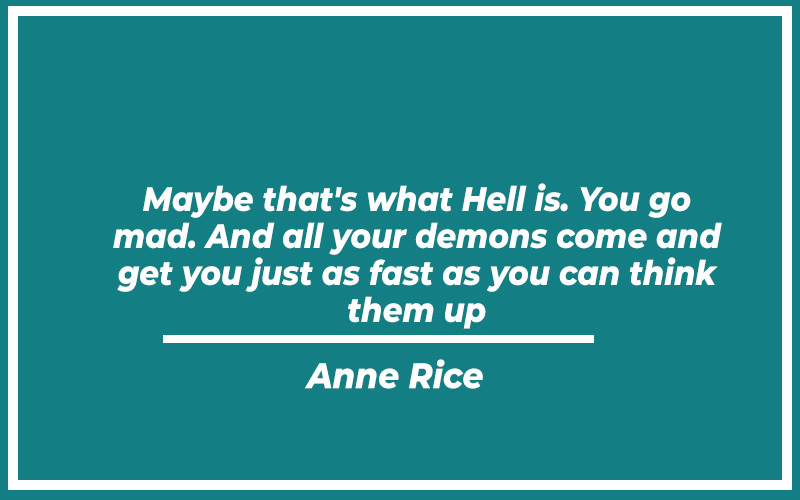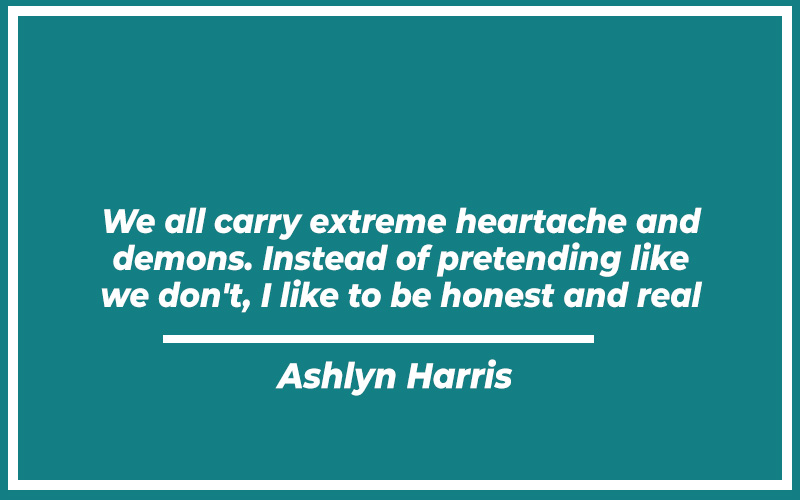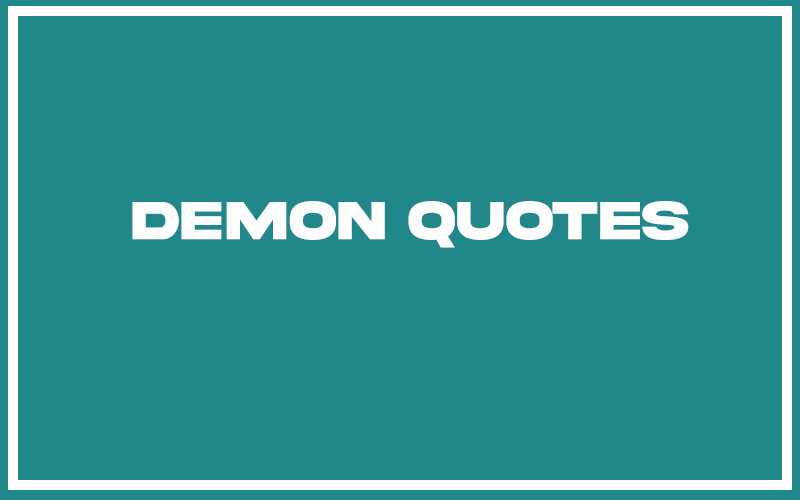Demon quotes explore the tougher parts of human experiences and the personal challenges you might face.
They are not just about scary creatures, but more about the fears and struggles that linger in everyone’s life, kind of like personal demons.
These quotes help you see that everyone deals with such issues, and by facing these darker moments, you can learn important lessons about yourself and even discover new strengths.
Best Demon Quotes

“Maybe that’s what Hell is. You go mad. And all your demons come and get you just as fast as you can think them up.” – Anne Rice
Anne Rice contemplates a chilling vision of Hell in her quote, suggesting that it is a state where one’s own mind becomes the greatest enemy. The demons here are not external but born from our darkest thoughts and fears, surfacing rapidly as we conjure them.
This portrayal not only emphasizes the psychological horrors that can plague one’s mind but also mirrors the torment of not being able to escape one’s own negative thoughts, making it a powerful metaphor for mental and emotional suffering.
Also read: Step Daughter Quotes (with Explanation)
“The love of power is the demon of mankind.” – Friedrich Nietzsche
Nietzsche famously critiques the human obsession with power, labeling it as a demonic influence over humanity. His perspective points to the destructive tendencies that arise when individuals or societies become enamored with power.
This quote serves as a warning about the moral and ethical decay that can result from power’s seductive nature, urging a reflection on how our desires can dominate and lead to downfall.
“When you are dining with a demon, you got to have a long spoon.” – Navjot Singh Sidhu
This quote uses a proverbial expression to illustrate the need for caution and preparedness when dealing with dangerous or morally ambiguous situations.
Sidhu’s imagery suggests that when engaging with potentially harmful forces, one must ensure they are well-prepared to protect themselves from being consumed or corrupted. It’s a call for prudence and a reminder that interactions with ‘demonic’ influences—whether literal or metaphorical—require careful strategic planning.
“The creative urge is the demon that will not accept anything second rate.” – Agnes de Mille
Agnes de Mille speaks to the relentless drive of creativity, describing it as a demanding force that pushes artists to reject mediocrity.
This ‘demon’ of creativity compels individuals to strive for excellence and authenticity in their work. It reflects the internal battle artists often face between their vision and the practical realities of creation, highlighting the intense personal standards to which many creators hold themselves.
“Demons, chaos, dragons – all of them are different incarnations and representations of our idea of death in ‘Dark Souls.'” – Hidetaka Miyazaki
Miyazaki, through his game design, integrates traditional imagery of demons and mythical chaos to personify death and the cycle of life and rebirth in the ‘Dark Souls’ series.
This quote highlights how cultural symbols like demons and dragons can encapsulate complex themes of mortality and the human condition, enriching the narrative depth and player experience in gaming.
“My demons are not that easy to shake.” – Jessie Reyez
Jessie Reyez’s straightforward confession acknowledges the persistent nature of personal struggles, whether they be mental health issues, past traumas, or internal conflicts.
This quote resonates with the universal experience of trying to overcome personal barriers that are deeply entrenched and not easily dismissed, offering a candid reflection on the difficulty of personal growth.
“If you have this enormous talent, it’s got you by the balls, it’s a demon. You can’t be a family man and a husband and a caring person and be that animal. Dickens wasn’t that nice a guy.” – Dustin Hoffman
Hoffman discusses the dual-edged nature of profound talent, describing it as a ‘demon’ that can consume one’s personal life.
This portrayal suggests that the pressures and demands of exceptional creativity can conflict with one’s ability to maintain normal relationships and a balanced life. It serves as a reflection on the sacrifices often made by those who pursue greatness in their fields.
“Confront the dark parts of yourself, and work to banish them with illumination and forgiveness. Your willingness to wrestle with your demons will cause your angels to sing.” – August Wilson
August Wilson speaks to the transformative power of facing one’s inner darkness. He suggests that acknowledging and addressing one’s flaws and fears can lead to personal growth and inner peace.
This quote underscores the idea that personal demons are not to be feared but understood and conquered through self-awareness and forgiveness. This process, Wilson posits, is not only healing but also uplifting, leading to a metaphorical chorus of angels that celebrates the triumph over darkness.
“If power made one evil, then God would be the Devil.” – Jonah Goldberg
Goldberg offers a provocative take on the nature of power and morality. His statement challenges the simplistic equation of power with evil, suggesting that if power inherently led to malevolence, then even divine entities, assumed to be the epitome of good, would be corrupt.
This quote invites reflection on the complexities of power and its impact on morality, pushing us to consider how power is wielded rather than its mere possession.
“Every time you forgive, you disappoint the devil.” – Rick Warren
Rick Warren highlights forgiveness as a powerful act of defiance against negativity and malevolence, personified here as the devil.
This quote underscores the strength it takes to forgive, positioning it as a victory over the destructive urges that feed discord and resentment. Warren’s perspective elevates forgiveness as not just a personal healing act but also a spiritual triumph.
“No man is a devil in his own mind.” – James A. Baldwin
James Baldwin’s insightful observation touches on the subjectivity of human morality. His words suggest that even those who commit acts that are widely viewed as evil do not view themselves as such.
This quote challenges us to consider the complexity of human psychology and the various factors that influence how individuals justify their actions to themselves.
“Doubt in love is the Devil in the paradise.” – Mehmet Murat Ildan
Ildan uses vivid imagery to describe the destructive power of doubt within relationships. He suggests that doubt can corrupt even the most blissful situations, likening it to a demonic force in paradise.
This metaphor serves as a caution against allowing insecurities and mistrust to undermine love, highlighting the importance of faith and confidence in maintaining the integrity of a relationship.
“With artificial intelligence, we are summoning the demon.” – Elon Musk
Elon Musk metaphorically compares the development of artificial intelligence to summoning a demon, suggesting that it is a powerful force that, once unleashed, may be difficult to control.
This quote reflects widespread concerns about the implications of advanced AI technology, highlighting fears that humanity might not be able to control or predict the consequences of such innovations.
“Over the centuries, mankind has tried many ways of combating the forces of evil… prayer, fasting, good works and so on. Up until Doom, no one seemed to have thought about the double-barrel shotgun. Eat leaden death, demon.” – Terry Pratchett
Terry Pratchett, with his characteristic wit, comments on humanity’s traditional methods of dealing with evil through spiritual and moral practices, humorously noting that the video game “Doom” introduced a more direct and visceral approach with its iconic weaponry.
This quote cleverly contrasts the literal demon-fighting in the game with more metaphorical or spiritual battles against evil in real life, showcasing Pratchett’s ability to blend humor with observation on human behavior.
“The demons are innumerable, appear at the most inconvenient times, and create panic and terror. But I have learnt that if I can master the negative forces and harness them to my chariot, then they can work to my advantage.” – Ingmar Bergman
Ingmar Bergman frames his personal demons not merely as adversaries, but as forces that can be controlled and utilized. This perspective emphasizes resilience and the potential to turn adversity into a strength.
By envisioning these challenges as horses that can be harnessed, Bergman suggests that what often seems to disrupt our peace can, through mastery and courage, be transformed into powerful allies in the journey of life.
“I think we all have demons, but my demons aren’t that bad. They’re productive demons. They keep me focused on the man I want to be and the life I want to live.” – Steve Kazee
Steve Kazee offers an intriguing perspective on personal demons, suggesting that they can play a constructive role in one’s life. Instead of being purely destructive, these ‘demons’ serve as motivators, helping him remain aligned with his aspirations and values.
This reflects a broader understanding that challenges and internal conflicts can actually drive personal growth and self-realization.
“Music, I think, is best when it honestly explores personal demons, and it stirs around in the silt of the psyche to find out what’s really there.” – Tom Morello
Tom Morello sees music as a powerful tool for introspection and expression, particularly when it confronts personal demons.
His view that music should dig deep into the ‘silt of the psyche’ highlights its therapeutic potential, suggesting that the best music often comes from a place of genuine emotional exploration and confrontation with the self.
“Deep down, I know I have this intuition or instinct that a lot of creative people have, that their demons are also what make them create.” – David Byrne
David Byrne touches on the often-discussed link between creativity and the struggles one faces internally. He suggests that these ‘demons,’ or personal challenges, are not just obstacles but also catalysts for creativity.
This insight speaks to the complex relationship between an artist’s inner world and their creative output, where internal turmoil often fuels artistic expression.

“We all carry extreme heartache and demons. Instead of pretending like we don’t, I like to be honest and real.” – Ashlyn Harris
Ashlyn Harris advocates for authenticity in addressing personal struggles and emotional pain. By acknowledging her ‘demons’ and heartaches openly, Harris challenges the common tendency to hide or minimize one’s struggles.
Her approach encourages a more honest and supportive dialogue about mental health and personal challenges, promoting a culture of openness rather than concealment.
“In any dispute, each side thinks it’s in the right and the other side is demons.” – Steven Pinker
Steven Pinker highlights the polarizing nature of conflict, where opposing sides often demonize each other.
This statement underscores the difficulty in achieving understanding and reconciliation, as each party views the other through a lens of moral and ethical superiority, often exacerbating conflicts rather than resolving them.
“You face your demons doing Bikram. You challenge them, beat them.” – Goldie
Goldie discusses the transformative power of Bikram yoga, a discipline known for its intense physical and mental challenges.
He suggests that the practice is not just about physical fitness but also about confronting and overcoming personal limitations and fears, metaphorically ‘beating’ one’s demons through persistence and resilience.
“Even in the grave, all is not lost.” – Edgar Allan Poe
Edgar Allan Poe’s reflection offers a profound sense of resilience and hope. This quote suggests that despite the finality and despair associated with death, there remains a possibility for something beyond, a hint at legacy or memory that endures.
Poe’s words encourage a view of life and death that transcends the traditional boundaries of loss, urging us to find continuity and meaning even in the face of the ultimate end.
“Paths are made by walking.” – Franz Kafka
Franz Kafka provides a simple yet deeply philosophical insight into the act of making choices and forming one’s path through life.
This metaphor emphasizes that actions, rather than preconceived plans, shape our destinies. It’s a reminder that only through movement and decision do we forge our futures, creating pathways where none existed before.
“You are not a drop in the ocean. You are the entire ocean in a drop.” – Rumi
Rumi’s poetic expression captures the essence of individual significance. This quote reflects the profound interconnectedness of all things, suggesting that each person embodies the whole universe within themselves.
It highlights the vast potential and depth found within each individual, a reminder of our own complexity and capacity.
“Man is condemned to be free; because once thrown into the world, he is responsible for everything he does.” – Jean-Paul Sartre
Jean-Paul Sartre’s existential perspective asserts the immense freedom and accompanying responsibility that characterize human existence.
This quote stresses the autonomy of choice and the weight of consequences that freedom entails, portraying life as a series of self-directed actions for which one is fully accountable.
“Words have no power to impress the mind without the exquisite horror of their reality.” – Edgar Allan Poe
Poe’s observation about the power of words underscores their impact when they convey deep, often unsettling truths.
This statement reflects his mastery in crafting narratives that engage with the darker, more intense aspects of human experience, suggesting that true resonance in literature stems from its ability to mirror the complexities of life.
“We suffer more often in imagination than in reality.” – Seneca
Seneca, a stoic philosopher, highlights the human tendency to create suffering through our anticipations and fears, which often surpass the actual hardships we encounter.
This quote encourages a more rational approach to the challenges we face, suggesting that much of our suffering is self-imposed and can be mitigated through perspective.
“All meaningful and lasting change starts first in your imagination and then works its way out. Imagination is more important than knowledge.” – Albert Einstein
Albert Einstein elevates the role of imagination above knowledge, suggesting that the genesis of significant transformations in our lives and society begins in the creative recesses of the mind.
This perspective values visionary thinking as the precursor to real-world application and change, advocating for a broader, more imaginative approach to problem-solving and innovation.
Also read: Animal House Quotes (with Explanation)
Final Thoughts
Demon quotes often touch on your personal battles and the darker parts of your character, but they also show you that facing these challenges can help you grow stronger and more creative.
These quotes remind you that it is normal for everyone to face their own issues, and dealing with these issues can make you better. Basically, these quotes suggest that it is okay to have fears and weaknesses as long as you face them and learn from them.

